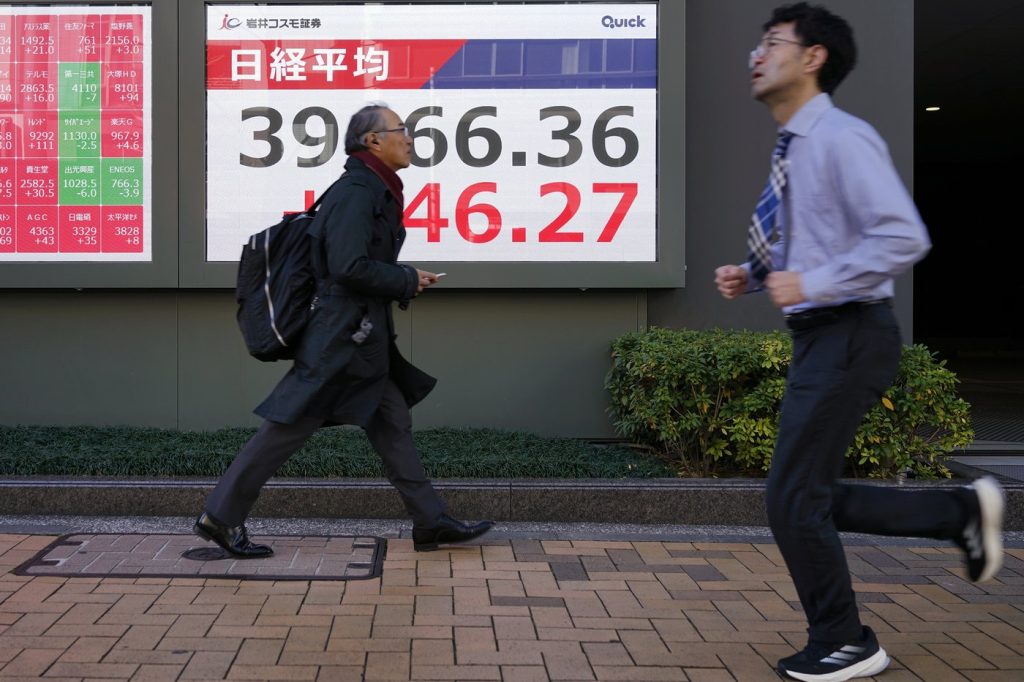HONG KONG (AP) – Asian shares experienced a significant uptick on Tuesday following President Donald Trump’s announcement that tariffs on imports from Mexico and Canada would be postponed for an additional month. This decision had a positive impact on market sentiment across the region as stocks rebounded in various countries.
The Hang Seng Index in Hong Kong rose by 2.10%, closing at 20,642.58. In Japan, the benchmark Nikkei 225 saw an increase of 1.61%, reaching 39,140.41, while South Korea's Kospi grew by 1.63% to end the day at 2,493.99. Australia’s S&P/ASX 200 managed a modest rise of 0.13%, reaching 8,390.20.
In tandem with these developments, the White House disclosed that Trump is set to engage in discussions with Chinese President Xi Jinping. This news generated hopes for a potential deal that might mitigate the risks of a broader trade war. Notably, Trump had just imposed a 10% tariff on Chinese goods, which was slated to take effect on the same day.
Canada's government confirmed that it had negotiated a temporary reprieve from U.S. tariffs, a development only announced after the conclusion of trading in U.S. markets. Analysts suggested that the markets on Tuesday were primarily influenced by the delay in the implementation of tariffs affecting nations such as Canada and Mexico.
Market strategist Yeap Jun Rong from IG noted that “the sharp pullback in the US dollar, along with tariff relief hopes, are likely to see markets retain their gains, barring any unexpected souring in US-China talks ahead.” Yeap emphasized that the postponement of tariffs offers immediate relief to investor sentiment and highlights Trump’s readiness to negotiate, possibly using tariff adjustments as leverage rather than as inflexible policy decisions.
In contrast to the positive performance in Asian markets, U.S. indices faced a downturn on Monday; the S&P 500 fell by 0.8%, while the Dow Jones Industrial Average declined by 122 points, or 0.3%. The Nasdaq composite experienced a drop of 1.2%. However, it is noteworthy that U.S. stocks later reduced losses after Mexico confirmed it had secured a month-long delay on the tariffs imposed by Trump.
On the energy front, benchmark U.S. crude oil prices dipped by $0.77 to $72.39 a barrel. Meanwhile, Brent crude, the international oil standard, faced a decline of 36 cents, settling at $75.60 a barrel. This decline in crude prices follows the turbulent market reactions to tariff announcements and negotiations.
In currency trading, the U.S. dollar strengthened slightly against the Japanese yen, moving to 155.13 from a previous value of 154.75. The euro, on the other hand, fell to $1.0317, down from $1.0345, reflecting shifts in market dynamics amid ongoing trade discussions and tariff uncertainties.
These market movements underscore the interconnectedness of global economic factors, where announcements regarding tariffs and trade negotiations directly impact investor confidence and market performance across various regions. The anticipation surrounding U.S.-China discussions adds another layer of complexity to the prevailing market conditions as stakeholders keep a close eye on potential outcomes.










